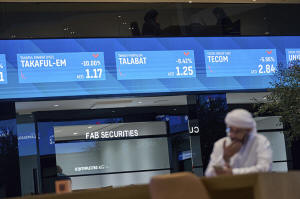Tariffs, oil prices and other uncertainties weighing down Mideast
economies, IMF says
[May 01, 2025] By
MALAK HARB
DUBAI, United Arab Emirates (AP) — Countries across the Middle East and
North Africa face significant challenges to economic growth as the
region faces economic uncertainty due to tariff measures,
lower-than-recent oil prices and cuts to financial aid, the
International Monetary Fund said Wednesday.
The IMF's regional outlook report for the MENA region said Brent crude
oil prices — which are down from highs above $120 a barrel in 2022 — are
likely to be $65 to $69 per barrel in 2025 and 2026, making
energy-exporting economies vulnerable to market fluctuations.
Tariff plans by the U.S. and other countries and geopolitical tensions
also have created mounting economic uncertainty globally that is
weighing down on the region's economies, which could negatively impact
their growth by anywhere from 2% to 4.5%, said Jihad Azour, director for
Middle East and Central Asia at the IMF.
"Therefore countries need to react and need to devise policies in order
to protect their economies,” Azour said in an interview in Dubai.
Reductions in foreign aid coming into the region also will play a role,
Azour said, as U.S. President Donald Trump has pulled his country back
from its position as the world’s single largest aid donor.
“The drop in international assistance, especially for countries in
fragility, is something that is creating new risks for the region,”
Azour said.

[to top of second column] |

An Emirati man is seen in the Dubai Financial Market in Dubai,
United Arab Emirates, Monday, April 7, 2025. (AP Photos/Fatima
Shbair, File)
 Growth in the MENA region is
expected to be 2.6% this year, as compared to 1.8% last year, Azour
said, but he added that global uncertainty could impact the outlook.
Economies in the Persian Gulf continue to attract substantial
foreign direct investment, rising by nearly 2% of GDP since the
pandemic, while other MENA nations struggle with slower inflows.
The IMF says it is willing to work with some of the struggling
nations and the new government in Syria. He also said that IMF staff
and Lebanese officials were in discussions in Lebanon.
“The Syria recovery will be a long process that would require
mobilization of regional and international support and also a
comprehensive program of building institutions, reforming their
economy, and also addressing a certain number of key issues like
infrastructure, refugees and rebuilding a new social contact,” Azour
said.
Despite the global economic uncertainty, MENA nations can drive
growth through structural reforms and diversifying economic ties,
the report said.
All contents © copyright 2025 Associated Press. All rights reserved |